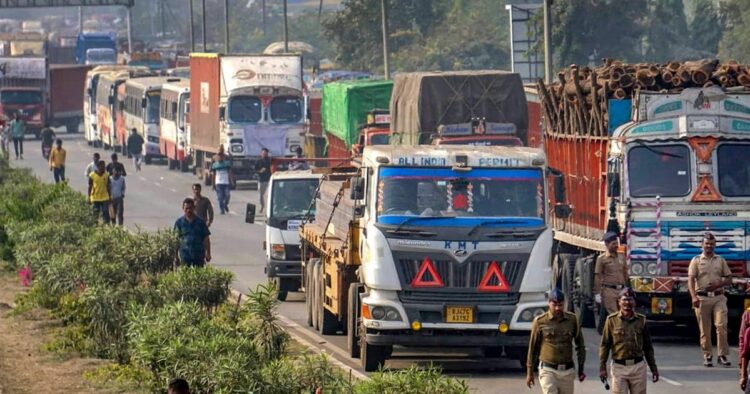In a significant development, the nationwide strike called by truck drivers’ associations has been called off following a crucial meeting held between their representatives and Union home ministry officials in New Delhi on January 2, as reported by media agency.
The contentious new rule on negligent driving, Bharatiya Nyaya Sanhita 106/2, has not been implemented yet, according to the government’s statement after the meeting with members of the All India Motor Transport Congress (AIMTC), the leading force behind the agitation.
Union Home Secretary Ajay Bhalla emphasized the government’s commitment to consult with AIMTC representatives before making a decision on implementing the new rule. “Before implementing Bharatiya Nyaya Sanhita 106/2, we will have a discussion with AIMTC representatives, and then only we will take a decision,” Bhalla stated.
Amrit Lal Madan, the president of the truckers’ body, revealed that Union Home Minister Amit Shah has agreed to put the new hit-and-run law, which triggered the truck drivers’ strike, on hold. Madan stated, “Amit Shah has kept the 10 years of punishment and fine that was imposed, on hold. Until the next meeting of the All India Motor Transport Congress is held, no laws will be imposed.”
The home ministry, in a statement issued post-meeting, reiterated that any decision to invoke the new hit-and-run law would be taken “only after consultation with the All India Motor Transport Congress.” The ministry also appealed to AIMTC and all drivers to return to their respective jobs.
The truckers’ strike had significant repercussions, with around 2,000 petrol pumps, primarily in western and northern India, running out of fuel stocks as the strike entered its second day on January 2. Despite efforts by state-owned oil firms to replenish stocks at most petrol pumps, some in Rajasthan, Madhya Pradesh, Maharashtra, and Punjab faced shortages due to heavy rush.
There were concerns about essential supplies, including vegetables, fruits, and milk, potentially being affected if the strike extended or evolved into a pan-India movement. The three-day strike, initiated on January 1 by some truck, bus, and tanker operators, protested against the stringent jail and fine regulations under the new criminal law, Bharatiya Nyay Sanhita (BNS), specifically addressing hit-and-run cases.
Under the BNS, replacing the colonial-era Indian Penal Code, a provision was introduced, prescribing a jail term of up to 10 years and/or a fine of Rs 7 lakh for serious road accidents caused by negligent driving, where drivers flee without informing the police. Truckers argued that stringent punishments for drivers, while mobs often go unpunished, were unfair, leading to their opposition to the new law.

















Comments